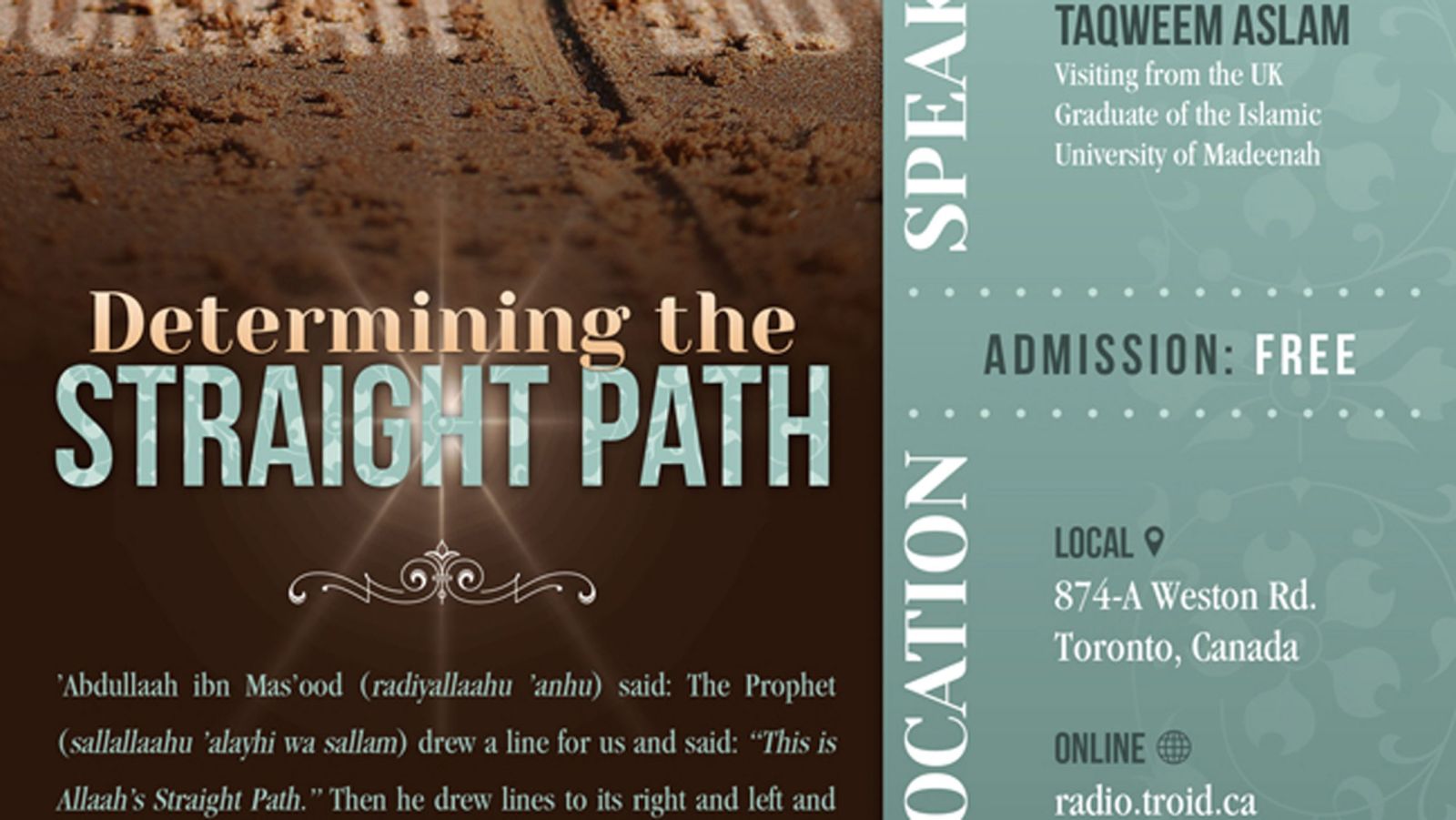The Hāʾiyyah Poem of Ibn Abī Dāwūd (d. AH 316)
Shaykh Mūsá Richardson
The following is the text from the poem, which was relayed during the 2007 Summer Islamic Courses at Masjid al-Furqān, using the explanation of Shaykh Ṣāliḥ al-Fawzān:
(1) Hold tightly to the rope of Allāh and the guidance,
And do not be an innovator, so that you might be successful.
(2) And practice your religion based on the Book of Allāh and the Sunan which
have come from the Messenger of Allāh so you will be saved and earn reward.
(3) And say: Not a created thing is the Speech of our great King,
Such was the religious position of the pious ones (before us) which they clearly expressed.
(4) And do not be a person who takes no position on the Qurʾān,
As did the followers of Jahm, and they had been too lax (to take the right position).
(5) And do not say that the Qurʾān is created, meaning: its recitation,
Since the Speech of Allāh, through its recitation, is made clear.
(6) And say: Allāh will make himself visible to the creation, openly,
Just as the full moon is not hard to see, and your Lord (will be seen) more clearly.
(7) And He was not born, nor has He fathered anyone,
Nor is there anything similar to Him, exalted be the Glorified One.
(8) A Jahmī rejects this, however, we have
As a testimony to the truth of what we say – a ḥadīth that clarifies it.
(9) Jarīr narrated it, from the words of Muḥammad,
So say what he said about that, and you will be successful.
(10) And certainly, a Jahmī will deny His Right Hand as well,
While both of His Hands are giving out all kinds of bounties.
(11) And say: The Ever-Compelling descends each night,
Without asking how; magnificent is the One God and most worthy of praise.
(12) Down to the lowest heaven, granting bounties from His Grace,
As the gates of the heavens are opened and spread widely.
(13) He says: Is there anyone seeking forgiveness who would like to meet a Forgiver?
Or anyone seeking bounties of goodness and provisions, so he could be given (what he requests)?
(14) A group has reported this whose reports are not to be rejected,
But sadly some have gone wrong and did not believe them, marring themselves.
(15) And say: Indeed the best of the people after Muḥammad
Were his two deputies of old, and then ʿUthmān, according to the most correct position.
(16) And the fourth of them was the best of creation after them,
ʿAlī, the companion of goodness, through goodness he was successful.
(17) Those are the people, those who we have no doubt about,
Upon the great camels of Firdows, shining brightly and roaming about.
(18) Saʿīd, Saʿd, Ibn ‘Awf, Ṭalḥah,
ʿĀmir of Fihr, and Zubayr the praiseworthy.
(19) And speak with the best terms about the Companions, all of them,
And do not be one who speaks ill of them, pointing out their faults and criticizing,
(20) Since the clear Revelation has spoken of their excellence,
And in (Sūrah) al-Fath are verses about the Companions, praising them.
(21) And regarding the pre-ordained Qadr, be convinced, since it is
The pillar that combines many affairs of the Religion, and the Religion encompasses much.
(22) And do not reject, out of ignorance, (belief in) Nakīr and Munkar,
Or the Pool or the Scales, surely you are being advised sincerely.
(23) And say: Allāh, the Great, will remove from, of His Grace,
Out of the Fire, people, burned severely, who will then be tossed
(24) Into the river in Firdows, wherein they will regain life by its water,
Like a seed taken by a flood that comes and wipes things away with its abundant water.
(25) And surely, the Messenger of Allāh will intercede for the creation.
And speak about the punishment of the grave, that it is the truth, made clear.
(26) And do not make takfīr of those who pray, even if they commit sins,
Since all of them commits sins, while the Owner of the Throne forgives graciously.
(27) And do not hold a belief like that of the Khawārij, for it is
A position held by only those who desire it, and it is destructive and disgraceful.
(28) And do not be a Murjīʾ, one who plays games with his Religion,
Surely, the Murjīʾ is joking about the Religion (ie. not taking it seriously).
(29) And say: Īmān (faith) consists of statements, intentions (i.e. belief of the heart)
And Actions, according to the explicit statement of the Prophet.
(30) And it decreases sometimes, due to disobedience, and sometimes
Because of obedience, it grows, and on the Scale it will outweigh (other things).
(31) And keep yourself from the opinions of people and their stances,
Since the stance of the Messenger of Allāh is more befitting and comforting to the chest.
(32) And do not be from those who play games with their religion,
Attacking the people of ḥadīth and reviling them.
(33) If you keep the belief contained within this poem all your life, O my companion,
You will be upon goodness, day and night.
Translated by Mūsá Richardson
Edited by Ḥasan Ṣumālī












